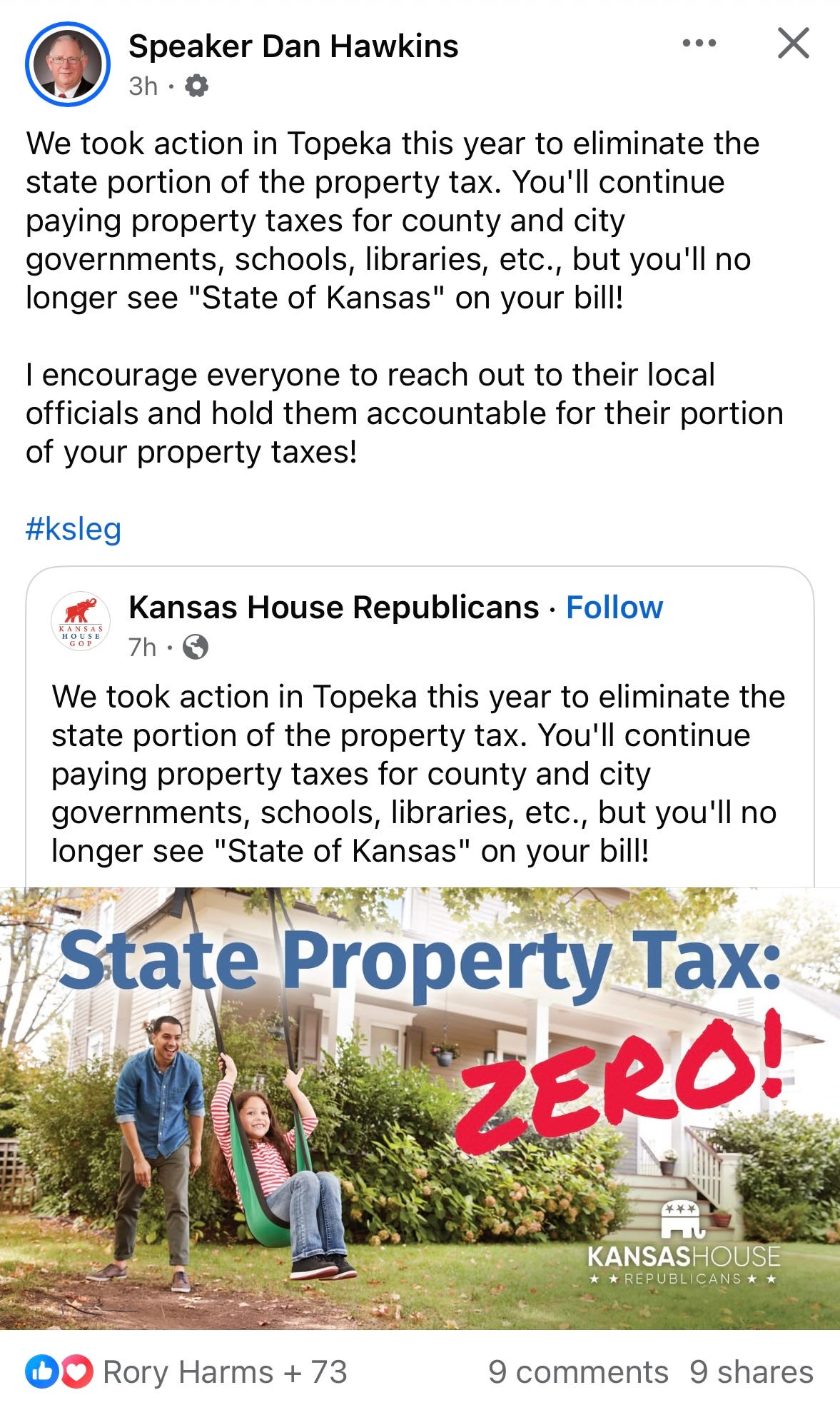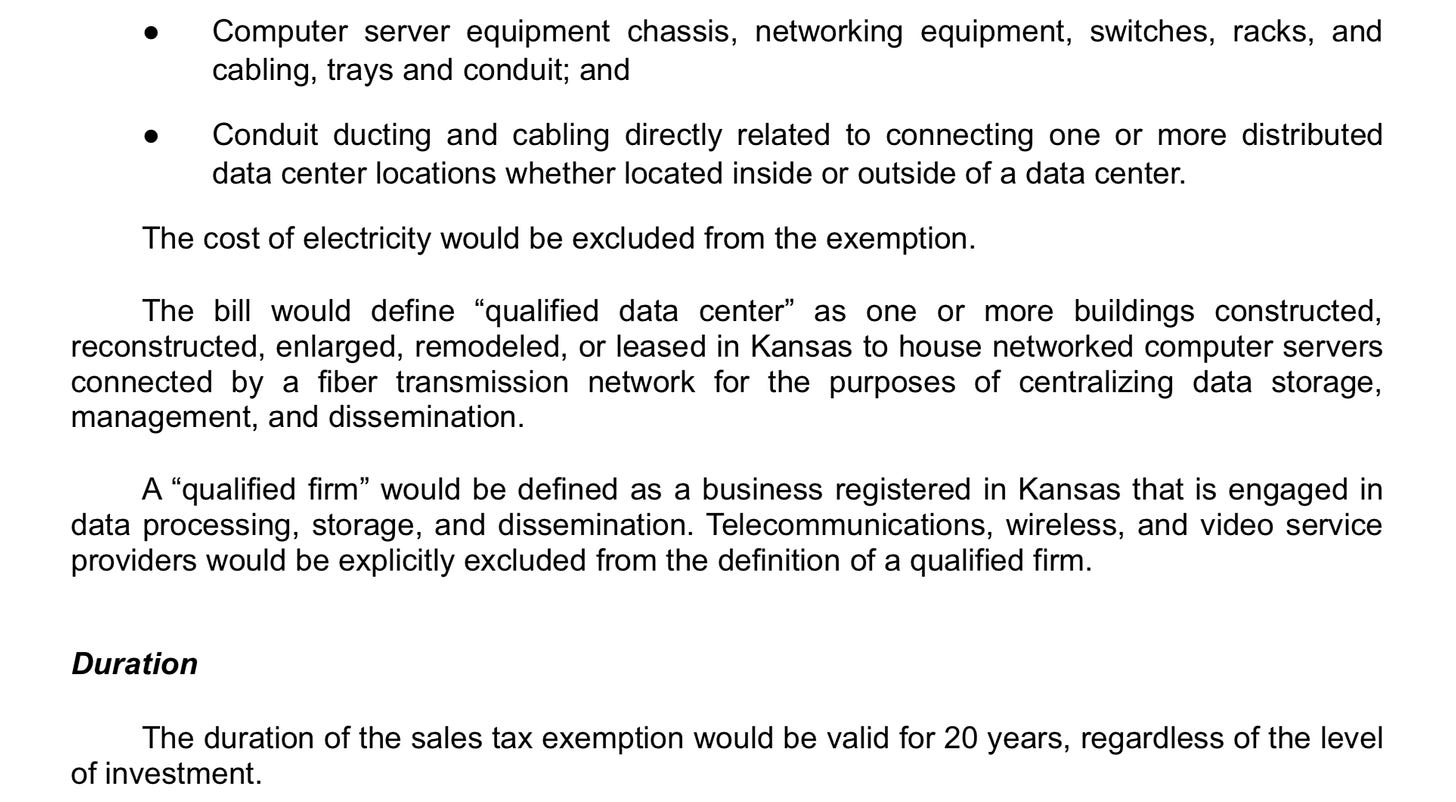Fact Check Friday: Big Data vs Property tax
Kansas Lawmakers hid a free tax ride for big data, passed at the 11th hour
I knew that the “forever” tax exemption that Big Data had been trying to push through the Kansas legislature the past several years must have been lurking around in the Kansas Legislature this session.
For at least the last three years, I saw the world’s biggest tech companies hire all the lobbyists in an effort to secure one of the most obnoxious corporate giveaways I’ve ever seen: A perpetual and infinite sales tax exemption for every piece of property, splinter of wood, electrical wire, computer, light switch - anything needed to build and upgrade a giant data center.
And, yes, if the investment was large enough, the tax exemption would outlive you and me, your children, and your grandchildren.
Before you read on, this might be a good time to go dig out your recent property tax notice. It’ll be good to have in your hand as your rage grows about how, despite their posturing and marketing, the Republican Supermajority Kansas Legislature found the will to create a brand new tax exemption that never existed before for an industry that many of its members have actively complained about, yet, couldn’t find a way to give you any real property tax relief, despite efforts to market the opposite.
I searched for this legislation, knowing that Facebook, Google, Amazon, and Twitter recently transitioned to X, wouldn’t just walk away from such a rich deal.
I couldn’t find it, though, because it was well hidden in another bill that was “Providing for the route 66 association of Kansas distinctive license plate.” If it wasn’t for the good work of the Kansas Reflector, neither I nor you likely would’ve learned about this at all.
(Please go look at the history of this bill. I’d explain all the shenanigans here, but you’d stop reading before I get to the point. SB98 bill passed the House 105-17, but that was when it was about a custom license plate. On the last day of the session, it was gutted and SB51 was inserted, where a brand-new tax cut for the wealthy could hide as an innocent feel-good bill without you noticing. This is the Gut-And-Go practice I attempted to ban in my first years in the legislature).
Here’s the bill’s transformation in visual form.
I’ll admit this bill is better than what has been presented in previous years. It limits the exemption to 20 years, instead of going on forever. And it only requires these data centers to purchase energy from public utilities (think Evergy) for 10 years, rather than forever prohibiting the ability to build on-site energy generation stations, which was in previous versions.
Let’s not kid ourselves into thinking these data centers won’t ask to renew the tax exemption, after they’ve already altered communities with their presence.
One of the selling points on this sales tax exemption is that without them large data centers won’t even look at Kansas. I say let them go somewhere else. They don’t create permanent employment, they are loud, they consume water, and in every community they’ve built in, residential property values have fallen because no one wants to live by them.
(Also, I really hope one of these data centers isn’t on its way to Hutchinson. There is a lot of excitement around construction of a new gas fired power plant here, and promises that the new power plant will allow new and bigger investment in Hutchinson. I hope it’s the sort that will create real jobs, not the hum, heat, and soulless architecture of a bunch of Artificial Intelligence machines).
People supporting these data centers argue that they’ll pay a lot in local property taxes - but if you think that’s true, then you don’t know a thing about the way modern business works. Big business forces states to compete by offering the sweetest deal, then pits local communities against one another to squeeze the most out of you and me, the taxpayers.
Small government, and free markets, indeed.
The Republican Supermajority in the Kansas Legislature campaigned on the promise of giving you real property tax relief. It was their top priority, they said. And with enough like-minded members in their ranks to override every single veto from the governor - a fact their leadership crowed about - they had the means to get it done.
Instead, this a partial list of what they did with your support and your vote…
You got less than $50 a year in tax relief on a $500,000 home.
They passed a flat tax that has a family making $50,000 and a family making $4,000,000 a year paying the same rate - except that there are loads of loopholes for the upper income earners.
They passed a corporate income tax that will cut income tax on the state’s wealthiest corporations, who will in time pay a lower rate than the families that work for them, and eventually will likely pay nothing.
They passed a wide-reaching and long-lasting tax exemption for Big Tech. Apple, Google, Amazon, Microsoft, and the like, will all enjoy a lifetime of exemptions that are far greater than anything you’ll ever see on property tax relief.
They ensured the state’s largest public utility will have a guaranteed market for the foreseeable future - by requiring these power hungry data centers to purchase electricity from companies like Evergy. We have no way to know precisely what effect that might have on residential utility rates. There was already concern that the giant Panasonic plant in De Soto would force a rate increase for residents because it would use so much energy.
The bottom line is that while campaigns centered on Property Tax relief, the Supermajority in Topeka delivered comprehensive and meaningful tax relief to everyone but property owners.
Who wins in this state?
Wealthy corporations, utility monopolies, and the state’s highest income earners.
You, meanwhile, will see no meaningful property tax relief this year. Or in future years, because these bills work to dedicate future state resources to wealthy tax cuts, instead of tax cuts for you or for investments in schools, roads, etc.
I want to say this again, because it’s REALLY important.
Future tax cuts, encumbered to a wealthy corporation such as Amazon or Facebook, is spending. It is a choice. And it reflects the priority of the legislature. The Kansas Legislature chose to provide tax relief for Big Tech and wealthy corporations - and they chose not to give you any real tax relief. They had the power to make any choice they pleased, and they chose corporations over Kansans.
Additionally, the Kansas Legislature did nothing meaningful to reduce the cost or increase the availability of child care - outside of undercut some safety regulations. Nor did they work to reduce or constrain healthcare costs in the state. These are two issues Kansans have raised concerns about for more than a decade - but have largely been ignored.
That’s because there’s a core philosophy among this group that when we use tax dollars to help wealthy corporations, it’s an investment, but if we use tax dollars to help people, it’s a handout.
The Kansas Legislature has done its work for the year, and it has decidedly picked the winners and losers.
The winners are the wealthiest corporations in the world.
The losers are the rest of us.
P.S.
Here is some additional reading. You’ll find that neighbors near data centers hate them, depressing home values, while investors love that they drive up the price of nearby rural agricultural land.
Here’s one that talks about conflict with neighbors.








